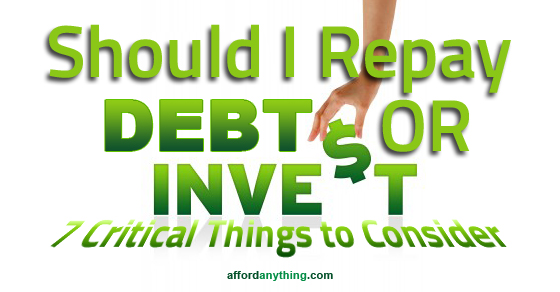Today’s letter comes from a 25-year-old reader named Chris, who asks:
“Invest for retirement or pay down debt? This may be more of a personal choice than anything, but I have been subscribed to the ‘pay down your debt before you invest’ camp for about a year now.
I should have my debt paid off by mid-2012 if I stick to that plan, but am I going to regret my year and a half hiatus from retirement contribution?”
“Repay debt or invest?” is a classic question; as timeless as “chicken or egg?” and “chocolate or vanilla?”
For those of you who haven’t heard this question before, here’s the background:
One school of thought says repaying your debt should be your top priority, no matter what. Debt psychologically traps you, and it guarantees you’ll lose money to interest payments every month.
Another school of thought advocates earning returns if there’s a spread between your investment returns and your interest rate. If you earn 7 percent through investments, and your interest rate is only 4 percent, then you’re losing 3 percent in opportunity cost by repaying debt.
These ideologies are arguing between risk and reward. The anti-debt camp focuses on your risk, the guaranteed loss of interest. The pro-invest camp focuses on the potential reward, the opportunity to multiply your gains.
Both crowds agree that if you have credit card debt with a 20 percent interest rate, you should pay it off immediately. But they hold different reasons.
The anti-debt crowd says you should repay your credit cards so you can stop losing money on interest. The pro-invest crowd believes you should repay that debt because you won’t find a reasonable investment that pays more than 20 percent.
Repay Debt or Invest: Which Crowd Is Right?
Personal finance is 90 percent behavioral psychology, rather than math, so you’ll need to make a personal choice.
But here are a few things to consider.
#1: Retirement Match
Does your boss offer a retirement match? If so, that’s a guaranteed 50 percent (or more) return on each dollar that you contribute. You can’t beat that rate.
If your job offers a retirement contribution match, squeeze it for every penny you can get. Otherwise you’re passing up a chance to earn 50 cents (or more) on every dollar.
#2: Tax Benefits
I’m the last person who will advise you to do something for tax reasons. Do something only if it’s a good idea. The tax benefit is icing on the cake.
That said, if you’re young and in a low tax bracket, investing in a Roth IRA could be a huge win. You’ll pay taxes on that income now – at your current low tax rate – and never pay a dime in taxes again, not even on dividends and capital gains. That’s huge.
If the interest rate on your debt is low enough, you might want to jump at the chance to waive dividend/capital gains taxes for the rest of your life.
#3: Your Interest Rate
The higher the interest rate on your debt, the harder it is to justify holding that loan. But how high is too high?
Historically, the U.S. stock market has returned 9 percent over the long-term. Warren Buffet predicts that the market will return roughly 7 percent in the coming decades.
In both cases, we’re discussing long-term averages. In the short term (1 – 5 years), the market could stagnate or collapse.
#4: Dividend Payouts
A safer way to invest would be to look at the return you can earn from dividend payouts.
Here’s how you calculate this:
One share from the McDonalds Corporation trades at $98. McDonalds offers a dividend payment of 70 cents per quarter, or $2.80 per year.
This means that for you’ll get $2.80 per year for each share of McDonalds stock you own – regardless of whether the stock price goes up or down.
What kind of return is that?
Take the yearly dividend payment = $2.80. Divide it by the price at which YOU buy the stock = $98. Multiply the result by 100.
(2.8/98)*100 = 2.85 percent. You’ll earn a 2.8 percent return from the dividend on this stock.
In January 2011, McDonalds was trading at $74 per share. If you had bought shares at that time, your dividend return would be 3.7 percent. (2.8/74)*100 = 3.78. The fact that the stock ALSO grew by $24 a share is just icing on the cake.
That’s why an essential truth about investing is that you make money when you buy, not when you sell.
As a general rule of thumb, you could collect about 3.5 to 4 percent in dividend returns if you target your money toward high-dividend stocks in today’s market. Don’t wade into this field unless you’re prepared to handle the volatility in the underlying value.
(Side note: The best way to handle this is to ignore it. Remember, stock price is purely theoretical unless you’re buying or selling.)
#5: Rental Properties
I can’t say enough good things about these. Buy properties with positive cash flow. This is a perfect example of the positive power of debt.
For a conceptual overview, check out this post.
#6: Launching Your Own Business
On one hand, small business loans are tough to get, and the interest rates are higher than, say, the rates on a student loan.
On the other hand, small business is incredibly risky. It might be the next Subway / Facebook / Pepsi, or it might fall flat on its face.
In my family’s business, we’ve avoided taking business loans unless we need “upfront” capital to fund a project we’ve been awarded. In other words, we avoid loans unless we have I.O.U.’s to match.
#7: Inflation
Everyone seems to forget this critical piece of the puzzle. If you hold debt, inflation is your best friend.
Why? Here’s how it works: Let’s say your mortgage is $1,400 per month. This is a fixed-rate payment; it will never change.
In 2012, that amount – $1,400 – has a certain amount of purchasing power. It can buy a round-trip ticket from New York to Cape Town. It can buy 1/3rd of a Louis Vuitton handbag.
But 30 years from now, that same $1,400 will buy a box of Saltine crackers and Cheez-Wiz. (I’m exaggerating, but you get my point.) Inflation will erode its purchasing power.
You repay your mortgage and other debts with “cheaper” dollars over time.
Inflation tends to average about 3 percent per year. If the interest on your debt is low (4-5 percent), you may consider hanging onto that debt.
Of course, if deflation strikes, you’re screwed. ☺
Final Thoughts
Don’t assume that debt repayment is risk-free. Both options carry risk; opportunity cost is expensive.
You’ll never remove risk, you can only pick the type of risk you prefer.
Photos courtesy Julian Stallabrass, Luke Wisley and roblisameehan.



